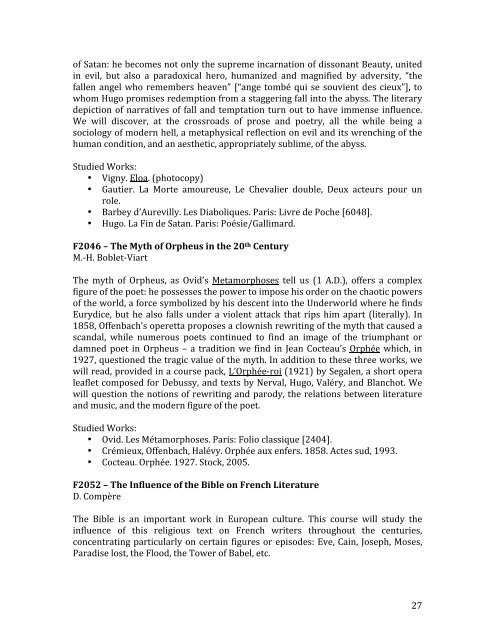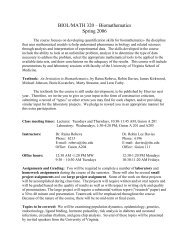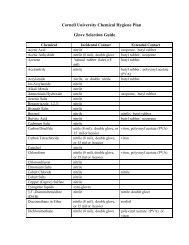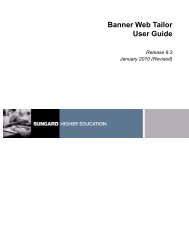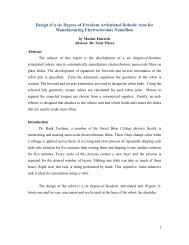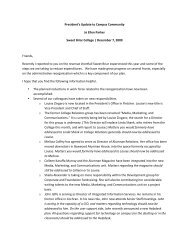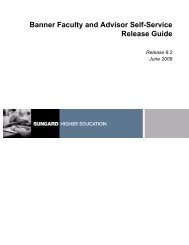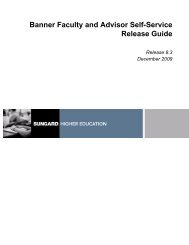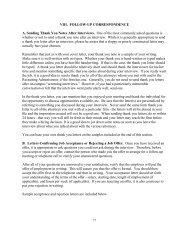Brochure - English translations of course offerings
Brochure - English translations of course offerings
Brochure - English translations of course offerings
Create successful ePaper yourself
Turn your PDF publications into a flip-book with our unique Google optimized e-Paper software.
<strong>of</strong> Satan: he becomes not only the supreme incarnation <strong>of</strong> dissonant Beauty, united <br />
in evil, but also a paradoxical hero, humanized and magnified by adversity, “the <br />
fallen angel who remembers heaven” [“ange tombé qui se souvient des cieux”], to <br />
whom Hugo promises redemption from a staggering fall into the abyss. The literary <br />
depiction <strong>of</strong> narratives <strong>of</strong> fall and temptation turn out to have immense influence. <br />
We will discover, at the crossroads <strong>of</strong> prose and poetry, all the while being a <br />
sociology <strong>of</strong> modern hell, a metaphysical reflection on evil and its wrenching <strong>of</strong> the <br />
human condition, and an aesthetic, appropriately sublime, <strong>of</strong> the abyss. <br />
Studied Works: <br />
• Vigny. Eloa. (photocopy) <br />
• Gautier. La Morte amoureuse, Le Chevalier double, Deux acteurs pour un <br />
role. <br />
• Barbey d’Aurevilly. Les Diaboliques. Paris: Livre de Poche [6048]. <br />
• Hugo. La Fin de Satan. Paris: Poésie/Gallimard. <br />
F2046 – The Myth <strong>of</strong> Orpheus in the 20 th Century <br />
M.-‐H. Boblet-‐Viart <br />
The myth <strong>of</strong> Orpheus, as Ovid’s Metamorphoses tell us (1 A.D.), <strong>of</strong>fers a complex <br />
figure <strong>of</strong> the poet: he possesses the power to impose his order on the chaotic powers <br />
<strong>of</strong> the world, a force symbolized by his descent into the Underworld where he finds <br />
Eurydice, but he also falls under a violent attack that rips him apart (literally). In <br />
1858, Offenbach’s operetta proposes a clownish rewriting <strong>of</strong> the myth that caused a <br />
scandal, while numerous poets continued to find an image <strong>of</strong> the triumphant or <br />
damned poet in Orpheus – a tradition we find in Jean Cocteau’s Orphée which, in <br />
1927, questioned the tragic value <strong>of</strong> the myth. In addition to these three works, we <br />
will read, provided in a <strong>course</strong> pack, L’Orphée-‐roi (1921) by Segalen, a short opera <br />
leaflet composed for Debussy, and texts by Nerval, Hugo, Valéry, and Blanchot. We <br />
will question the notions <strong>of</strong> rewriting and parody, the relations between literature <br />
and music, and the modern figure <strong>of</strong> the poet. <br />
Studied Works: <br />
• Ovid. Les Métamorphoses. Paris: Folio classique [2404]. <br />
• Crémieux, Offenbach, Halévy. Orphée aux enfers. 1858. Actes sud, 1993. <br />
• Cocteau. Orphée. 1927. Stock, 2005. <br />
F2052 – The Influence <strong>of</strong> the Bible on French Literature <br />
D. Compère <br />
The Bible is an important work in European culture. This <strong>course</strong> will study the <br />
influence <strong>of</strong> this religious text on French writers throughout the centuries, <br />
concentrating particularly on certain figures or episodes: Eve, Cain, Joseph, Moses, <br />
Paradise lost, the Flood, the Tower <strong>of</strong> Babel, etc. <br />
<br />
27


